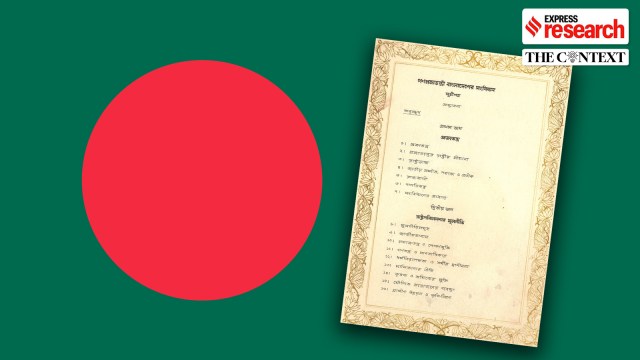The recent violence against Hindus and the desecration of temples in Bangladesh have sparked intense discussions on minority rights. Do these acts violate Bangladesh’s constitutional commitments? The Constitution of Bangladesh came into force in November 1972, and carries multiple provisions safeguarding the rights of minorities in the country.
Since gaining independence in 1971, Bangladesh has emerged as one of the world’s most active constitutional laboratories. At the time of its liberation, Bangladesh carried the weight of Pakistan’s colonial legacy. Despite this, just 325 days after independence, the country adopted a full Constitution on November 4, 1972.
The first step toward creating a constitution was taken on March 23, 1972, with the enactment of the Bangladesh Constituent Assembly Order, which established a Constituent Assembly. The 430-member Constituent Assembly held its inaugural two-day session on April 10, 1972. On the first day, the Assembly elected a speaker and deputy speaker and adopted its rules of procedure. The following day, a 34-member Constitution Drafting Committee was formed, led by Dr Kamal Hossain, Minister of Law and Parliamentary Affairs.
Story continues below this ad
The Drafting Committee held 74 meetings, spending nearly 300 hours to complete its work. They invited proposals from individuals and institutions for consideration during the preparation of the Constitution. Abul Fazl Huq, in his article Constitution-Making in Bangladesh, notes that the response was limited, likely because a general consensus on the fundamentals of the Constitution had been reached.
The final meeting of the Committee was held on October 11, 1972, when the Constitution Bill was approved. Most objections were raised by Opposition members of the National Awami Party, who proposed recommendations and described 14 articles as undemocratic.
On October 12, the Constitution Bill was introduced in the Constituent Assembly by the law minister, and the draft was published in major Bangladeshi newspapers. It was emphasised that the Constitution was based on four core principles — democracy, socialism, nationalism, and secularism — mandated by the people.
The final reading of the Bill was conducted on November 4, 1972, with speeches from the Prime Minister and an opposition member. At 1.10 pm, the Constitution of the People’s Republic of Bangladesh was unanimously adopted. “It is rare for a vital document like a Constitution to be adopted only 24 days after its introduction in the Constituent Assembly,” notes Huq.
Story continues below this ad
The Bangladesh Constitution’s view on minorities
Minorities, including approximately 20 million Hindus, Christians, Buddhists, and Ahmadiyyas, make up a significant portion of Bangladesh’s population and are guaranteed rights under the Constitution. The Preamble outlines the core principles of nationalism, democracy, socialism, and secularism, which form the foundation of the state’s legal framework.
Article 2A declares Islam as the state religion, yet it ensures equal status and rights for Hindus, Buddhists, Christians, and followers of other religions. In alignment with this, Article 8(1) enshrines secularism as a fundamental principle of state policy, alongside Bengali nationalism, democracy, and socialism. Following the 15th amendment, Article 12 outlines how secularism will be upheld by eliminating communalism in all its forms, including granting political status to any religion by the State, the abuse of religion for political purposes, and any discrimination or persecution of individuals based on their religious practices.
Moreover, Article 23A places a responsibility on the state to safeguard and promote the unique cultures and traditions of the diverse tribes, minor races, ethnic sects and communities within Bangladesh. Complementing this, Article 28(1) ensures that discrimination based on religion, race, caste, sex, or place of birth is prohibited by the state, guaranteeing equal access to public places, entertainment, and educational institutions for all citizens.
Additionally, Article 38 guarantees the right to form associations but prohibits the creation of groups that seek to disrupt religious, social, or communal harmony or foster discrimination based on religion, race, caste, place of birth, or language. Together, these provisions reflect Bangladesh’s commitment to ensuring the rights and protection of its minority communities.
Story continues below this ad
Article 41 guarantees freedom of religion, allowing every citizen to profess, practice, or propagate any religion, subject to public order and morality. Article 41(1)(b) further ensures the right of religious communities to establish, maintain, and manage their own religious institutions. Additionally, Article 41(2), which mirrors India’s Article 28, safeguards the rights of students by ensuring they cannot be required to receive religious instruction or participate in ceremonies related to a religion other than their own.

































